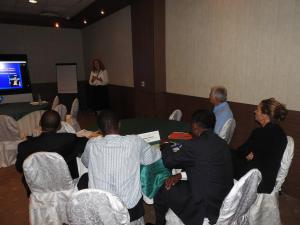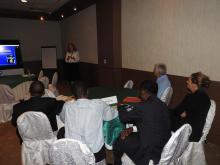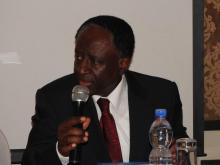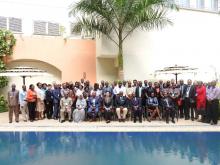The East African Regional Public Health Emergency Operations Centre and Incident Management Training Workshop kicks off in Tanzania
Dar es Salaam, 31 July- 4 August 2017 - In today’s connected world, health insecurity is a global issue. We must all protect ourselves, and each other, from threats like infectious diseases, chemical, and radiological events. On hundred and ninety six countries including Tanzania have agreed to work together to prevent and respond to public health crises, in line with the International Health Regulations (IHR (2005)).
In the WHO African Region, about 100 public health events are reported annually. The major outbreaks reported in the past two years are cholera, meningitis, Ebola virus disease, Lassa fever, H5N1, yellow fever and Zika virus disease.
It is important that countries are equipped to respond to the outbreaks. In East Africa, countries currently have different levels of in-country emergency management capacity, staff experience in public health response, and development of their public health emergency management programs.
In order to harmonize and strengthen capacity for emergency management across the region, the WHO AFRO and CDC co-sponsored and are facilitating the East Africa Regional Public Health Emergency Management and Preparedness Workshop (PHEM) from 31 July to 4 August, hosted by the United Republic of Tanzania.
The goal of the workshop is to further enhance existing regional guidelines, tools, standard operating procedures, and terms of reference in line with the public health Emergency Operations Centre (EOC) network and WHOs Framework for a Public Health Emergency Operations Centre (PHEOC).
The workshop has brought together 51 EOC and emergency management experts from Ethiopia, Kenya, Liberia, Nigeria, Sierra Leone, Tanzania, and Uganda.
Opening of the five-day workshop was by the Permanent Secretary, Dr. Mpoki Ulisubisya, representing the Minister for Health, the WHO Representative in Tanzania, Dr. Matthieu Kamwa, and the United States Chargé d'affaires in Tanzania, Ms. Inmi Patterson.
The Permanent Secretary in his opening remarks stated, “the PHEOC is the eyes of what is happening in real time on the ground during a public health incident.” Highlighting the gaps to be addressed, he underscored the need to have trained staff, strong health systems, and equipped structures for an effective emergency response. He concluded by assuring of the continued Government of Tanzania support and commitment to strengthening national health security that, jointly with other countries, contributes to regional and global health security.
The WHO Representative, Dr. Matthieu Kamwa, in his message congratulated the Government of Tanzania for hosting such an important workshop and for its leadership in addressing health insecurity in Africa, it being among the first six countries to establish a Public Emergency Operations Centre (PHEOC). He noted that in the African Region and particularly in East Africa, numerous outbreaks and public health emergencies are becoming more frequent. “The backbone of preparedness and response to emergencies is the Emergency Operations Centre; furthermore, establishing a fully functional PHEOC meets one of the requirements of the International Health Regulations (IHR 2005)” emphasized Dr. Kamwa.
In her remarks, Ms. Inmi Patterson reminded participants that diseases do not respect boundaries and in a globalized world, diseases and epidemics can spread overnight. She underscored that in 2050, the population in Africa is projected to reach 2.5 billion. Ms. Patterson stressed, “networks formed, and skills gained by participants during the workshop will play an important role in safe guarding Africa’s population health beyond the health sector.”
During the five-day workshop, the experts will engage in:
• Discussions on the integration of IHR (2005), integrated disease surveillance and response (IDSR) and Global Health Security Agenda and the new tools available;
• Understanding application for key concepts, principles, functions of the emergency management, and the Incident Management System principles;
• Discussion n coordination and communication approaches to plan for and respond to an infectious disease outbreak;
• Explore how discrete international, national, and communal organizations contribute to the management of a public health emergency response
• Acquire skills to determine actions, tasks, and progressive steps that lead to effective coordination and management of response activities
• Share the status and progress made by countries, identify key issues and best practices on EOC implementation
A tangible benefit of this workshop is that it will facilitate enhanced inter-regional coordination and collaboration to enhance a timely response to regional disease outbreaks or other regional public health events of significant concern.
At the same time was a high-level executive briefing aimed at sensitizing policy decision makers on the crucial role of the PHEOC, emergency management principles, incident management system, governance, funding, and sustainability, for effective preparedness and response to public health crises.
Tel: +255 754 287 875
Email: sagutig [at] who.int
Email: muitam [at] who.int
Tel: +255 766 896 370
Email: kileon [at] who.int
Tel: +255 755 551 804









